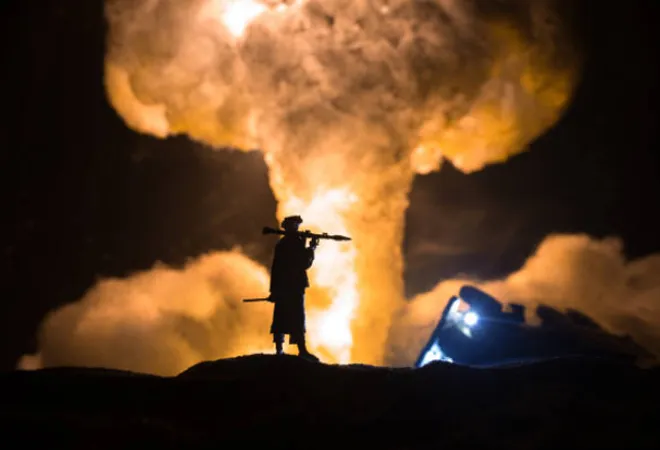
The dramatic siege of Afghanistan by the Taliban has posed serious questions about the stability, security, geostrategy, and geopolitics of the Central Asia Republics (CARs). A recent UN report highlights the presence of over 10,000 foreign fighters from the neighbouring countries of Central Asia, Pakistan, and the Xinjiang Uyghur Autonomous Region (XUAR) of China in Afghanistan, most of whom are in the ranks of the Taliban, al-Qaeda, and the Islamic State in the Khorasan Province (ISKP). In addition, the presence of Central Asian terrorist groups like the Islamic Movement of Uzbekistan (IMU), Islamic Jihad Union (IJU), Jamaat Ansarullah, and others in Afghanistan have heightened the fears of the current turmoil in Afghanistan spilling over into the CARs.
Terrorism and terror organisations in Central Asia
The breakup of the erstwhile Soviet Union in 1991 saw the birth of Kazakhstan, Kyrgyzstan, Turkmenistan, Tajikistan, and Uzbekistan. The rise of terrorism in the Af-Pak region in the 1980s had a significant impact on these newly-formed and economically fledging CARs. The long period of uncertainty and chaos that followed saw the rise of the IMU and IJU in Central Asia, threatening harmony and stability of the region. After failed armed incursions in Central Asia, mainly in Tajikistan, Uzbekistan, and Kyrgyzstan, the IMU and IJU recoiled to Afghanistan. These organisations faced heavy losses and were forced to move to Waziristan during the past 20 years of US-led occupation of Afghanistan.
After failed armed incursions in Central Asia, mainly in Tajikistan, Uzbekistan, and Kyrgyzstan, the IMU and IJU recoiled to Afghanistan.
With the signs of the resurgence of the Taliban, these Central Asian terror outfits, with the support of radicals, recommenced their operations. By 2013, 3,000 fighters of IMU and IJU worked closely with Taliban, and in the ranks of al-Qaeda and Tehrik-e-Taliban Pakistan (TTP). With the Af-Pak region as their base, these terror outfits organised 19 terror attacks in the CARs and killed 138 people, especially in Kazakhstan, Tajikistan, and Kyrgyzstan between 2008 and 2018. The period also witnessed an increase in armed violence along the border between Afghanistan and CARs. Furthermore, the repressive policies of the CARs have exponentially increased radicalism and fuelled extremist ideology in the region. According to reports, more than 4,000 Central Asians migrated to Syria and Iraq to join the ISIS and Jabhat Fateh. However, after the Syrian and Iraq fiasco, in 2018, ISKP through a video message was successful in persuading many of these fighters from ISIS and Jabhat Fateh to join their ranks in Afghanistan.
Given this scenario, the current dramatic turn of events in Afghanistan have thus added to the worries as Tajikistan, Turkmenistan and Uzbekistan share a 2,387-kilometre long spongy border with Afghanistan. Ever since the Taliban started the military offensive, thousands of Afghan military personnel and civilians, in an attempt to escape from the Taliban’s brutalities, have reportedly crossed over into Central Asia.
The repressive policies of the CARs have exponentially increased radicalism and fuelled extremist ideology in the region.
New security implications and response of CARs
The deteriorating security situation and the presence of resurgent Central Asian terror outfits have forced the CARs to reach out to the Taliban. Tajikistan also mobilised 100,000 active servicemen, 130,000 reserve officers and soldiers on July 22 and sent 20,000 security forces to the Afghan border. To prevent the tension from snowballing into a full-scale conflict in its immediate neighbourhood, Russia too has sent military equipment to the Tajik-Afghan border under the Collective Security Treaty Organisation (CSTO). Russia has also held military exercises with Tajikistan and Uzbekistan, 20 kilometres away from the Afghan border, to show its military preparedness against any Taliban misadventure or any other terror outfit from the region.
On 6 August, the CAR leaders met in Turkmenistan to boost regional cooperation and discussed regional challenges amidst the growing security crisis in Afghanistan. They voiced concerns over the instability in Afghanistan and also discussed the presence of Central Asian terror groups within Afghanistan along the borders with three CARs. Though leaders of the region are concerned with the growing influence of terrorists and exportation of terrorism via the spongy borders; they are also anxious about the regional geostrategic and geoeconomic fallout. Tajikistan has also displayed its uneasiness on the growing influence of the Taliban in the region. Tajikistan is particularly tense about the resurgence of the Tajik terrorist group Jamaat Ansarullah, known in Afghanistan as the “Tajik Taliban”, who were given charge of the strategically important northern border by the Taliban.
To prevent the tension from snowballing into a full-scale conflict in its immediate neighbourhood, Russia too has sent military equipment to the Tajik-Afghan border under the Collective Security Treaty Organisation (CSTO).
On the other hand, Uzbekistan and Turkmenistan, despite their participation in the joint military drills, have also hosted Taliban delegations to strengthen ties with the group for geostrategic and geoeconomic reasons. Both these countries are dependent on a stable Afghanistan for the continuity of their trade and energy links. Uzbekistan requires cooperation of the Taliban for South-Central Asian economic connectivity, trade, and transit. Similarly, Turkmenistan needs security for its export of natural resources and to diversify its export energy markets. For example, the projects like Central Asia-South Asia Electricity Transmission Project (CASA-1000), the Turkmenistan-Afghanistan-Pakistan-India (TAPI) Gas Pipeline Project, and Turkmenistan-Afghanistan-Pakistan Power Interconnection Project (TAP) need stability and security of Afghanistan for investment and execution.
More challenges ahead
The Central Asian terror groups in Afghanistan will support the Taliban as they renew and rejuvenate the idea of establishing the Caliphate from Afghanistan to the European border. The porous borders and the reactivated terror outfits will have a significant impact on the security and stability of the CARs. Though the Taliban have assured the CARs that they will not allow any group to attack neighbouring countries or engage in combat near the borders, the spillover effects can spread fast given the poverty, human rights violations, and corruption in most of the CARs. Armed with sophisticated weaponry left behind by the withdrawing US troops, these terror groups are expected to add to the complexities and diffusion of the regional landscape.
Turkmenistan needs security for its export of natural resources and to diversify its export energy markets.
The evolving security situation in Afghanistan will also limit the efforts of CARs to diversify its connectivity routes to control the colonial ambitions of China. For example, the CARs have shown interest in diversifying regional energy exports via the Chabahar port that is being developed by New Delhi to balance their reliance on China. Uzbekistan also built a 75-km railway line between Mazar-i-Sharif and Hairatan town at the Uzbek-Afghan border in 2011, with financial assistance from the Asian Development Bank. On the contrary, such geostrategic and geoeconomic attempts might see a reversal, as the fragile security situation in Afghanistan and terror threat will sabotage the initiatives. This will not only force the authoritarian regimes of the CARs for more dependence on China and Russia on security issues than earlier but will also give these regimes a chance to use the spectre of terrorism to suppress the people and restrict civil liberties. These repressive policies in the recent past increased the grievances of the people and fuelled terror recruitment.
The views expressed above belong to the author(s). ORF research and analyses now available on Telegram! Click here to access our curated content — blogs, longforms and interviews.




 PREV
PREV


